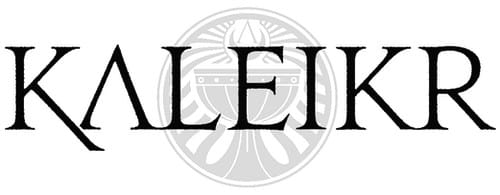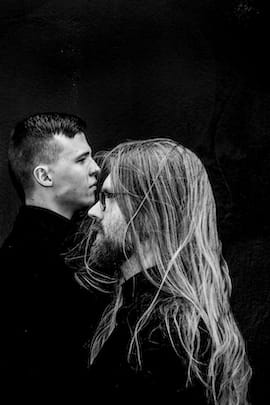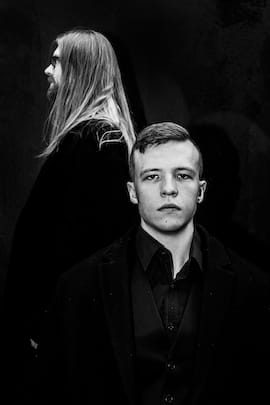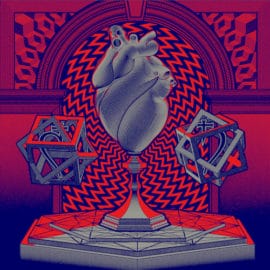„Heart Of Lead“, the debut album from the Icelandic progressive black metal duo KALEIKR is an extraordinary piece of extreme sound art, giving its listeners a deep insight into the depths of the human mind. In the following interview with drummer Kjartan Harðarson, you can read more about why the band which formerly existed under the name Draugsól settled for another name, for what reason there are strings to be heard on the album beside the usual metal instruments as well as why the band was eager to work with Stephen Lockhart as producer.

Greetings! I am glad that you could take the time for this interview. How do you feel?
Feeling great! Especially now since we just wrapped up our first live performance at Ascension Festival. It was a huge success for us.
You create your music in KALEIKR as a duo. How did you get to know each other and how comes you decided to form a band together?
We actually met first in 2014 with the mutual intention of forming a black metal band in Reykjavik, Iceland. That band was Draugsól. We later disbanded Draugsól and the two of us formed KALEIKR as our new creative outlet.
What was the reason for changing the name from Draugsól to KALEIKR?
Some personal differences came into play but we also had more expansive ideas musically than we thought Draugsól could offer being very focused on black metal. We wanted to expand into more progressive territory.
I have the impression that there’s influences of the Icelandic black metal style in your music, but in combination with completely different sounds. How would you describe your music in this regard?
I’d say we have some influences from the Icelandic scene due to us being in that scene ourselves and the scene being very small. I think all the bands end up taking if only just a little bit from their peers. We take influences from a very broad spectrum of music so it’s difficult for us to pinpoint exactly where we are sound wise but I always just go for extreme progressive music as a description now.
 Your debut „Heart Of Lead“ was compared by some to Enslaved and Opeth. Would you say that these bands have influenced you to some extent or do you primarily have other role models?
Your debut „Heart Of Lead“ was compared by some to Enslaved and Opeth. Would you say that these bands have influenced you to some extent or do you primarily have other role models?
Both are great bands and we both in a way grew up listening to these bands along with many more, of course. We totally get the references but we didn’t put any focus on sounding similar to these bands. Our sound is just a mashup of everything we like in extreme music.
While your songs sometimes sound quite unusual, many bands are content to chase after their idols. Would you say that it is difficult to develop a completely independent style?
It’s certainly difficult to find something completely new nowadays since music in general is a very saturated scene. Even the extreme music scene. But I personally think the key to doing something original is to take everything you’ve heard and liked in music and create what you would most want to hear. Don’t chase one sound or one band. We describe KALEIKR as music straight from the heart and we feel we’ve done exactly that.
The creation of your first album took quite a long time, didn’t it? What was the reason for that?
We started writing the album in early 2016 so it took about three years from the point it got serious to the album actually being released. There are many reasons for this being such a long process ranging from personal issues to time restraints. Creating something that deals with emotion in the way „Heart Of Lead“ does, takes time to nail correctly and it’s often a heavy burden for the creator, dealing with very personal subjects.
How does the songwriting work in your band – do you work on the lyrics or the compositions first?
We create all music before any lyrics are written. We then write lyrics based on the sound and what we feel when we listen/play the music.
As far as I know, on „Heart Of Lead“ you describe the inner life of a person who plunges ever deeper into darkness, right? Could you tell us a little bit more about this concept?
We have described the concept as a journey from sadness through despair to total mental collapse. We travel through the mind of a person dealing with profound emotional pain. „Heart Of Lead“ describes the weight of that pain.
Would you say that you look for catharsis in the music yourself or do you approach the themes you sing about from a rather distant perspective?
I’d say it’s a mix of both. We don’t write about actual events or feelings directly but we are strongly guided by personal struggles and digging deep into our minds.
 Would you say that there is a certain climax on the album or did you rather aim to constantly increase the tension until the end?
Would you say that there is a certain climax on the album or did you rather aim to constantly increase the tension until the end?
Every song on the album has tension and release parts within themselves and all these different parts make the album feel like tension and release. We increase and decrease throughout.
Which of your tracks would you call your masterpiece so far and why?
I personally wouldn’t call any song more of a masterpiece than the other as I see the album more of a cohesive piece of art. I will mention „The Descent“ and „Neurodelirium“ as two favorites as they were some of the first songs we wrote and I feel they capture a lot of our different styles.
The strings on your debut were recorded by Árni Bergur Zoëga. Why was it important for you to use string instruments in these tracks and how did it come to the collaboration with Árni?
As the album progressed we started adding ideas and layers to further our musical vision. We felt some parts could be emphasized more with added strings so we decided to include viola parts in certain places. We needed to find someone to play the viola parts on a relatively short notice. We knew Árni actually from the Draugsól days as he was the producer and mixer for „Volaða Land“, Draugsól’s debut. He stepped up to the task and recorded the viola parts for us, adding his unique twist to it in the process.
Are you considering also using other instruments in your songs in the future that you haven’t used before?
We love to experiment with different sounds and it’s entirely possible that we might use some nontraditional instruments in the future.
For the production you worked with Stephen Lockhart. Like many other albums produced by him, „Heart Of Lead“ sounds rather surreal and blurred. Was this your intention and if so, for what reason?
Our intention right from the beginning was to work with Stephen. We are great fans of his unique sound and he has become a very prominent figure in the Icelandic scene. We felt he’d deliver the most professional work and the sound closest to our vision.
 The artwork of the album looks psychedelic, but also shows a few obscure symbols. Can you explain to us what thought lies behind it?
The artwork of the album looks psychedelic, but also shows a few obscure symbols. Can you explain to us what thought lies behind it?
The artwork is entirely the artist’s interpretation of our music and lyrical concept. We worked with Metastazis for this artwork and they have a strong catalogue of very surreal looking and striking artworks. We love it!
Do you already have plans for the near future of KALEIKR? Maybe already ideas for the stylistic course of your next release?
We have big plans for KALEIKR. We have some rough ideas already to how we want our next release to sound but nothing nailed down. Our focus for the time being is performing live and we are looking into doing some touring soon.
Next I would like to go through our traditional Metal1.info brainstorming with you. What do you first think of when reading the following terms?
Psychoanalysis: Enlightening
Best Icelandic band: HAM
Surrealism: Dreamy
Psychoactive substances: Evoking
Debemur Morti: Thankful
Environmental protection: Dilemma
That brings us to the end of our interview, thanks a lot again. Would you like to say a few last words to the readers?
Thank you to everyone who has supported KALEIKR so far. It means the world to us. We are just getting started.
Dieses Interview wurde per E-Mail geführt.
Zur besseren Lesbarkeit wurden Smilies ersetzt.
